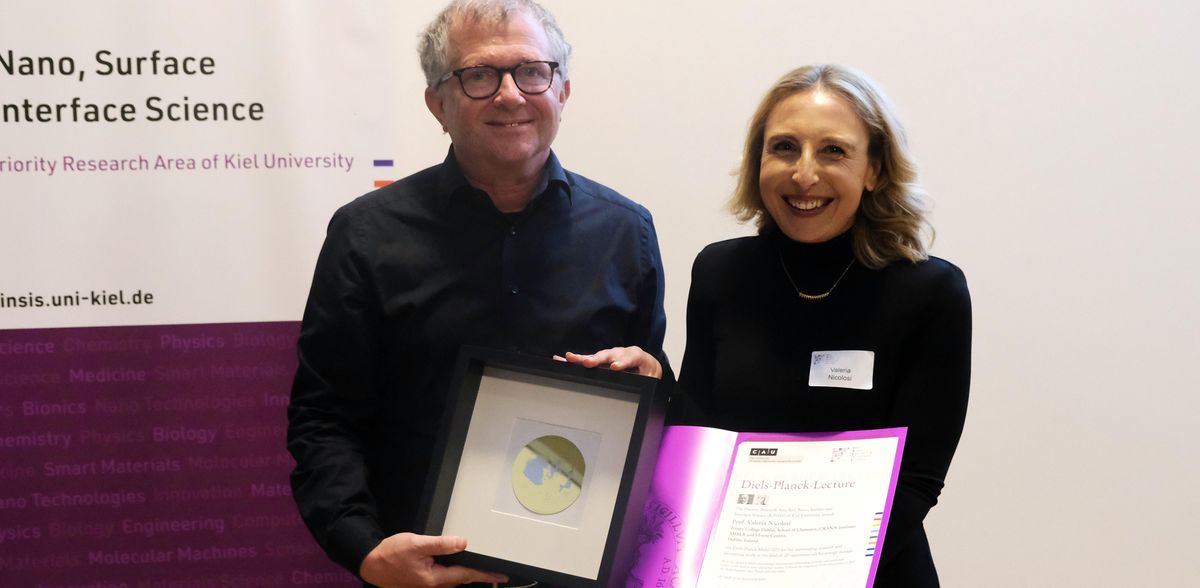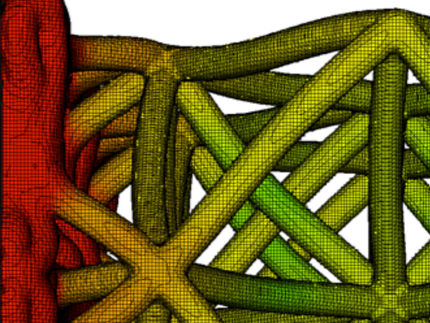Battery researcher Valeria Nicolosi receives the Diels-Planck Medal
Valeria Nicolosi, Professor of nanomaterials at Trinity College Dublin, is awarded the Diels Planck Medal of KiNSIS for her pioneering work in energy storage. This is the tenth time that the interdisciplinary network "Kiel Nano, Surface and Interface Science" at Kiel University has honoured internationally outstanding researchers in the nanosciences and surface research who have significantly shaped their field. Valeria Nicolosi has developed innovative nanomaterials and 3D printing processes that enable batteries with particularly high energy densities. The prize was awarded during KiNSIS Symposium "Health Meets Energy" that took place in Kiel on October 9 and 10. At the same event, the best doctoral theses of the past year in the field of nanoscience and surface research in Kiel were honoured.
Enabling real innovation through interdisciplinary research
"We see interdisciplinary research in particular, as driven by our priority research areas at Kiel University such as KiNSIS, as particularly important for developing innovative solutions to major challenges such as health or energy," said Simone Fulda, President of Kiel University, in her welcoming address. "Prizes for excellent research such as the Diels Planck Medal are also important for the visibility of science in society". Fulda also encouraged the awardees to continue their academic careers. "We need such highly motivated young scientists in view of the global challenges we face."
Materials scientist Valeria Nicolosi is internationally recognised as a leading expert in the field of ultra-thin 2D nanomaterials. Her research focuses on novel materials such as graphene. Composed of a layer of carbon just one atom thick, graphene is extremely light, yet 20 times stronger than steel and electrically conductive. With these unique properties, it could enable the next generation of semiconductors and energy storage devices, such as faster and lighter batteries, smartphones or other electronic devices. Their recent research into 3D printed electronics could enable batteries that can be embedded in any type of material, from smart watches to clothing to implanted heart devices.
Young researchers honoured for the best dissertations
On the same evening, the KiNSIS research programme also honoured the best dissertations from various fields of nano and surface research in Kiel. Dr Nicholas Bungert, a pharmacist, was honoured in the field of life sciences for his dissertation on interactions between particles in powder mixtures for inhalation. The Physics prize went to Dr Luka Hansen for his work on plasma surface processes that can be used to control the properties of nanomaterials. Two prizes were awarded in the engineering sciences category: Materials scientist Dr Haoyi Qiu was honoured for his research into environmentally friendly antifouling coatings for maritime applications. Dr.-Ing. Mevlüt Yalaz did his doctorate in the field of biomedical engineering in the Collaborative Research Centre 1261 "Magnetoelectric Sensors" on deep brain stimulation using magnetic field sensors. The KiNSIS spokespersons presented the awards, each worth €1,000, and congratulated the winners on their promising work, which has significantly advanced their respective fields of research.
Also at the symposium, Dr Fatemeh Davoodi from the Institute of Experimental and Applied Physics received the 5,000 euro KiNSIS Early Career Award for her research on the development of electron-driven photon sources using artificial intelligence.
"With events like this award ceremony or the symposium, we aim to bring together excellent scientists across disciplines, institutions and career stages," said Professor Jeffrey McCord, member of the KiNSIS Board. "Meeting outside one's own circle inspires new ideas and collaborations that enable real innovation. This not only advances international materials research and nanotechnology, but also our society," adds Professor Kai Rossnagel from the KiNSIS Board.
Other news from the department people
Most read news
More news from our other portals
See the theme worlds for related content
Topic World Battery Technology
The topic world Battery Technology combines relevant knowledge in a unique way. Here you will find everything about suppliers and their products, webinars, white papers, catalogs and brochures.

Topic World Battery Technology
The topic world Battery Technology combines relevant knowledge in a unique way. Here you will find everything about suppliers and their products, webinars, white papers, catalogs and brochures.






























































